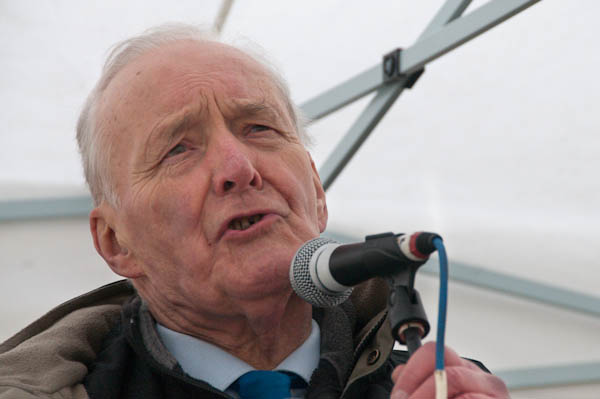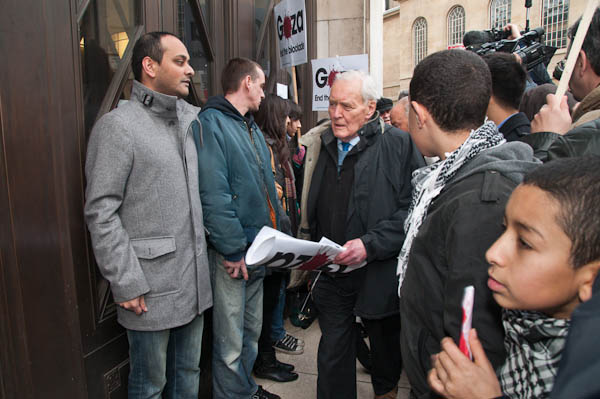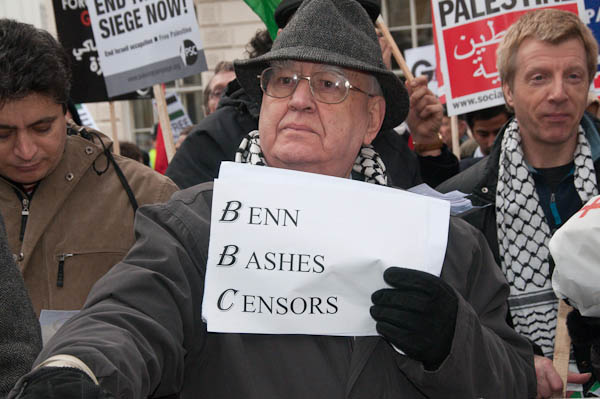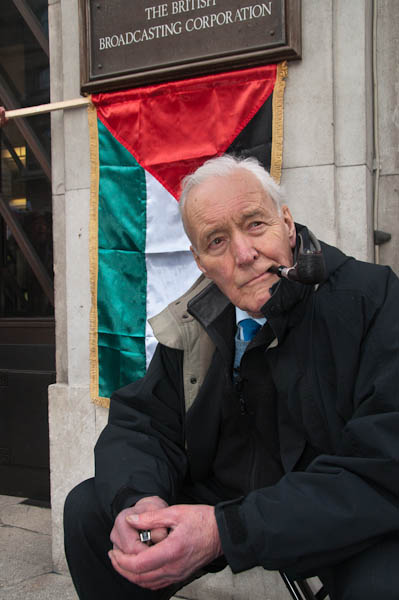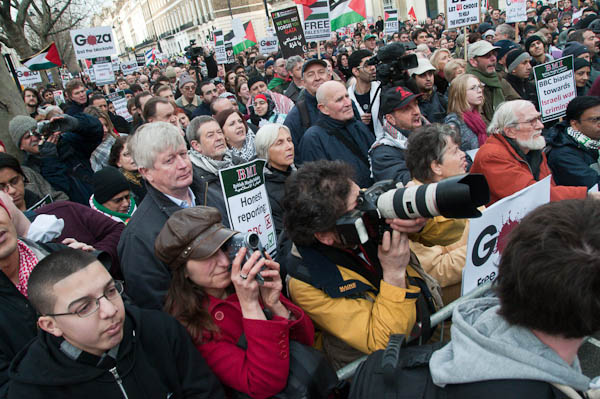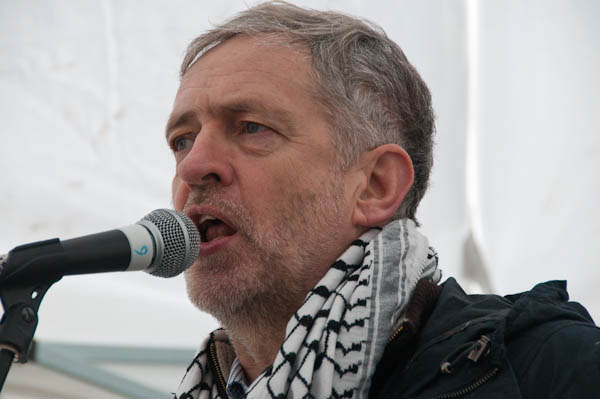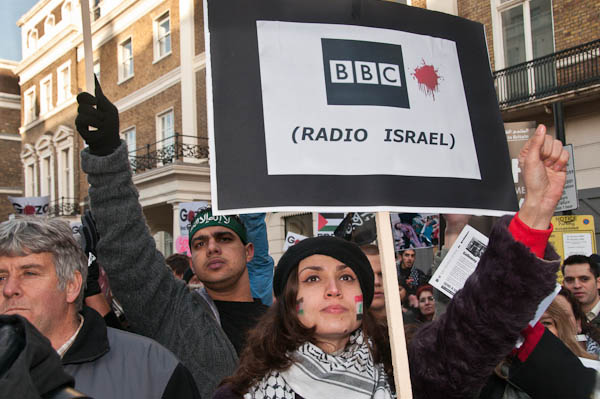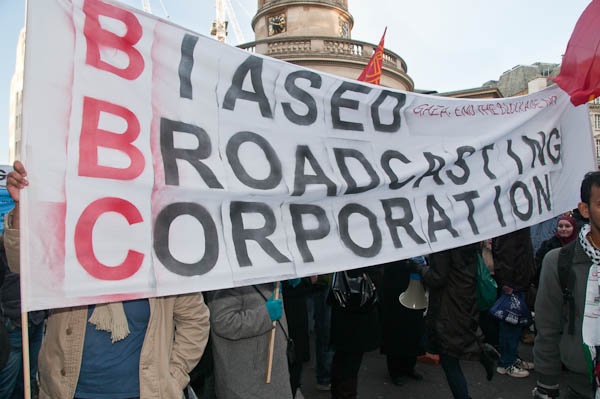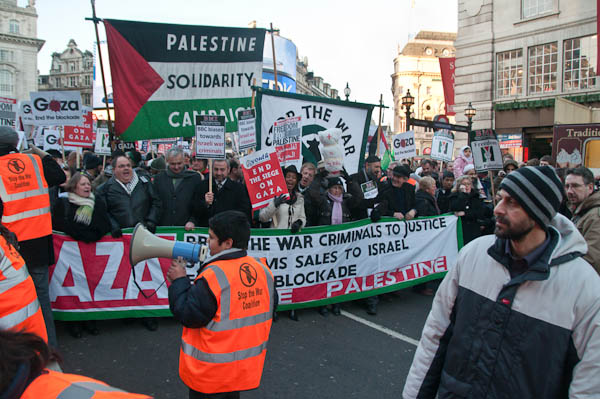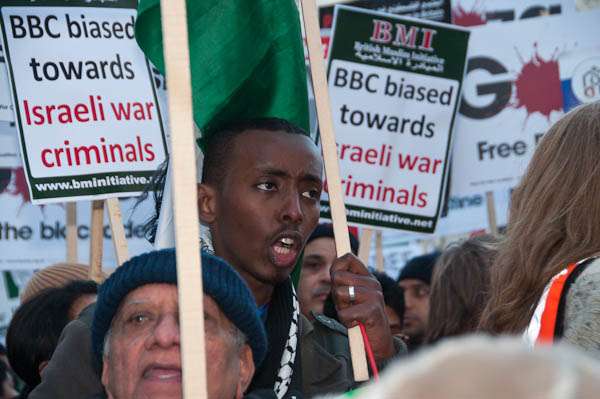Students, World Service, Kashmir & Dr Sen – 2011: On Wednesday 26th January 2011 the Education Activist Network had called for students to come to a protest in Trafalgar Square against education cuts. But it wasn’t clear what they intended to do and few had bothered to come. In the end most of them decided to go to join the NUJ protest against cuts in the BBC World Service at Bush House which I had also been intending to go to. And since it was India’s Republic Day there were also a couple of protests outside the Indian High Commission a few yards down the road from there.
Student Day of Action – Trafalgar Square
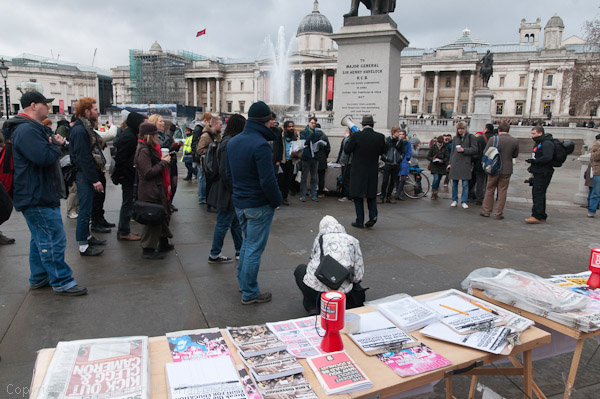
The event organisers, the Education Activist Network who describe themselves as “group of educationalists, lecturers, and students who campaign against cuts in adult, further and higher education” had called on students to walk out of their schools and colleges and come to a protest in Trafalgar Square, but there appeared to have been little planning about what would then happen.
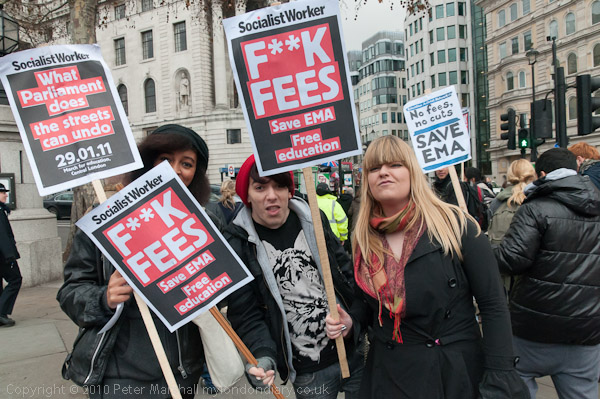
Fewer than a hundred had turned up and there were a couple of literature stalls collecting petition signatures and selling the Socialist Worker etc there appeared to be just one man with a megaphone. Several others came up and made short speeches against the cuts and a Heritage Warden and myself took some photographs but nobody knew what to do next.
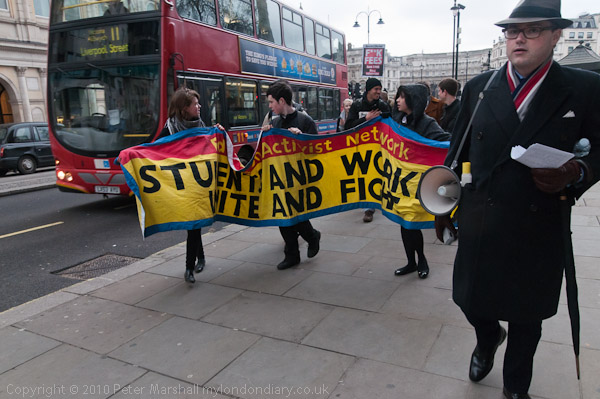
A few people stood around holding Socialist Worker placards with the message F**K FEES – Save EMA – Free Education and others. After some discussion most decided to march to Aldwych where the NUJ were holding a protest I had planned to photograph against cuts in the BBC World Service’.
Save the BBC World Service – Bush House, Aldwych
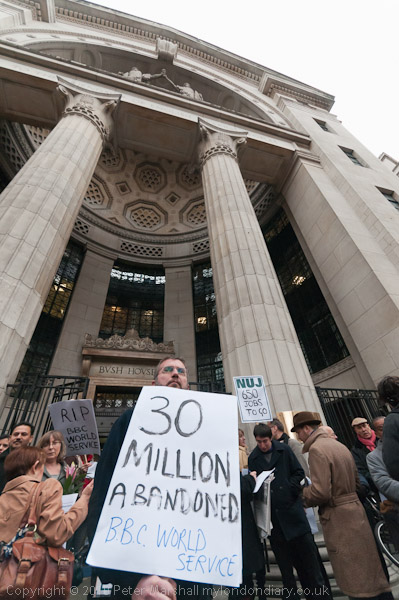
Bush House was built overlooking Kingsway as a major new trade centre for American industrialist Irving T. Bush, who approved its designs in 1919 but this imposing Portland Stone Grade II listed “most expensive building in the world” was only finally completed in 1935. A few years later in 1941 it became used by the BBC and became the headquarters of the BBC World Service. The BBC’s lease expired around a year after this protest and they did not renew it, with the building being taken over in 2015 by King’s College.
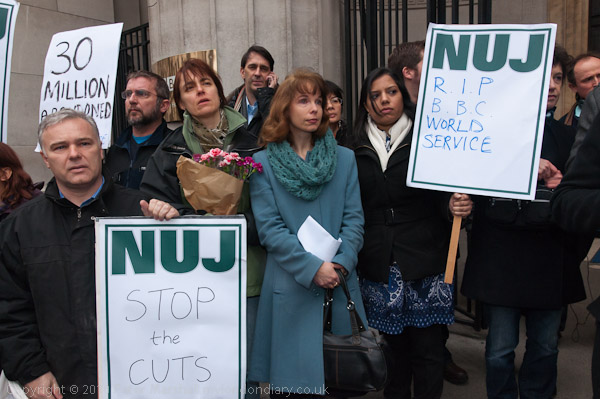
The BBC World Service has a well-deserved reputation as the best in the world and is an important part of the UK’s ‘soft power’. NUT General Secretary jeremy Dear who spoke at the protest put it well: “The diversity of staff and their presence in so many key locations around the world contributes to making the BBC World Service the leading voice in international broadcasting. At its best the World Service can challenge corruption, expose human rights abuses and promote democratic values. By cutting the service the government will cut British influence in the rest of the world, and cuts will also be deeply damaging for objective quality news services around the globe.“
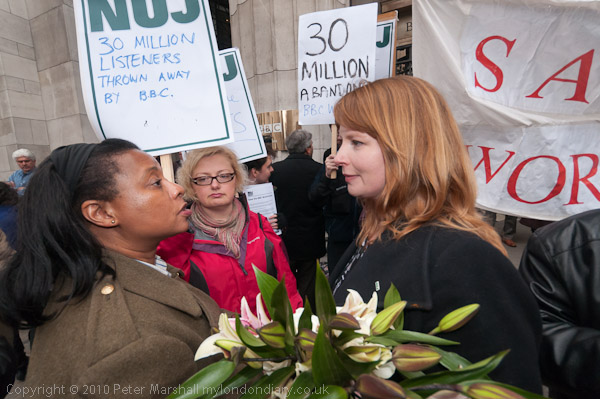
Government cuts in the grant from the UK’s Foreign & Commonwealth Office for the World Service announced in October 2010 and the transfer of the service in 2014 completely to the license fees led the BBC in January 2011 to announce swingeing cuts, axing Portuguese for Africa, Caribbean English, Macedonian, Serbian and Albanian services, the end of all shortwave radio services and more. These cuts were estimated by the BBC to result in a loss of more than 30 million listeners across the world, including in India, China and Russia.
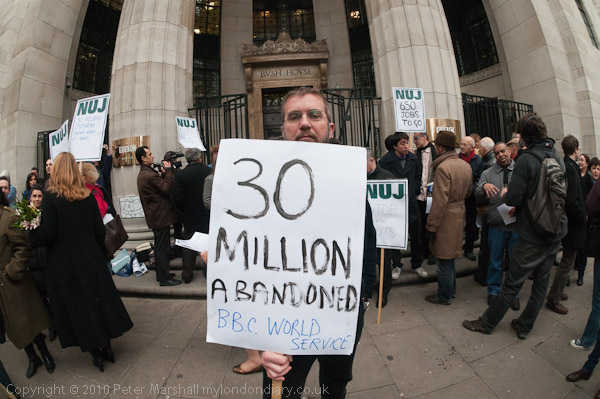
The cuts were also expected to result in 480 BBC employees losing their jobs in 2011 and a further 170 by the time the service became entirely licence fee funded in 2014. Many of the NUJ members taking part in the protest would be among those made redundant.
Free Kashmir & Khalistan – Indian High Commission, Aldwych
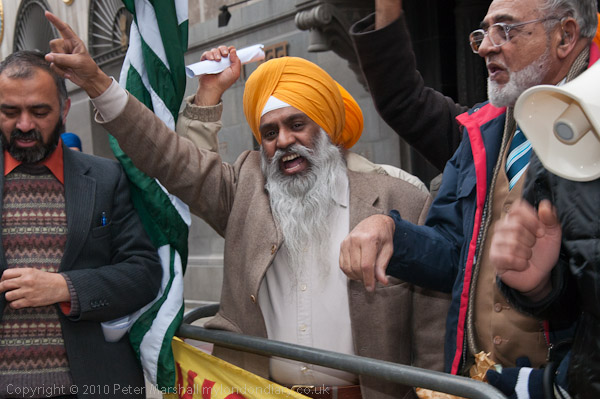
Kashmiris and Sikhs held a protest together outside the Indian High Commision on Republic Day, the 61st anniversary of the Indian Constitution, calling for the freedom that their nations have been denied by Indian military repression.

Kashmir was an ancient kingdom, becoming a Muslim monarchy in 1439, later a part of the Sikh empire but again becoming a monarchy under British guidance in the 19th century. But Kashmir – as well as the Sikhs – were unfairly mistreated in the negotiations for Indian independence and the 1947 partition.

Although Kashmir has am 80% Muslim population its then Maharajah ceded the kingdom to India as a way to protect his privilege and rule against an invasion by Pakistan. In return Kashmir was granted some limited autonomy by the Indian Constitution (revoked in 2019.)

Kashmiris campaigning for freedom from Indian rule have been savagely repressed and the country has a huge occupying force of Indian troops and police, with widespread human rights abuses, many continuing to be imprisoned, tortured and murdered.

Both India and Pakistan have been found by UN bodies and other investigations to be guilty of widespread human rights abuses in the areas of Kashmir they administer. The UN in 1948 called for the people of Kashmir to be allowed to determine their future by a free and fair vote, but this has never been possible due to the opposition of both India and Pakistan. A small part of the country is also occupied by China, doubtless also abusing human rights.

Protesting with the Kashmiris were Sikhs, also neglected at Partition which divided the Punjab between India and Pakistan. Widespread agitation for their own independent state of Khalistan was accelerated by the 1984 attack by the Indian Army on the Golden temple at Amritsar, and the widespread anti-Sikh riots and killing which after the assassination of Prime Minister Indira Gandhi by her Sikh bodyguards which followed. As in Kashmir, Sikhs in India have suffered widespread and continuing human rights abuses.
Release Binayak Sen Now – Indian High Commission
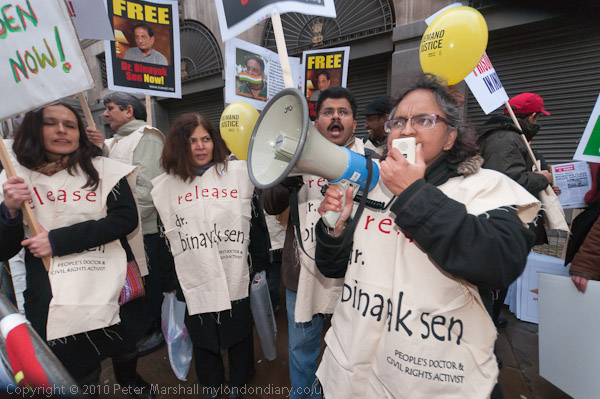
Dr Binayak Sen is a highly regarded Indian doctor, internationally recognised for his work with indigenous and marginalised people with a lifetime of service of the rural poor.

He helped establish a hospital serving poor mine workers in Chhattisgarh and founded a health and human rights organisation that supports community health workers in 20 villages, and was an officer of the People’s Union for Civil Liberties (PUCL).

Dr Sen criticised the state Government’s atrocities against indigenous people who were fighting the handover of their lands for mining, and their establishment of an armed militia, the Salwa Judum, to fight against the Naxalite (Maoist) rebels in the area.

In 2007 he was arrested and charged with having links with the Naxalities and was held in prison until granted bail two years later in May 2009. But in December 2010, Dr Sen was found guilty of sedition and conspiracy and sentenced to life imprisonment. At the time of the protest his appeal was continuing. He was granted bail in April 2011 and the case against him has not been pursued.
Flickr – Facebook – My London Diary – Hull Photos – Lea Valley – Paris
London’s Industrial Heritage – London Photos
All photographs on this page are copyright © Peter Marshall.
Contact me to buy prints or licence to reproduce.
